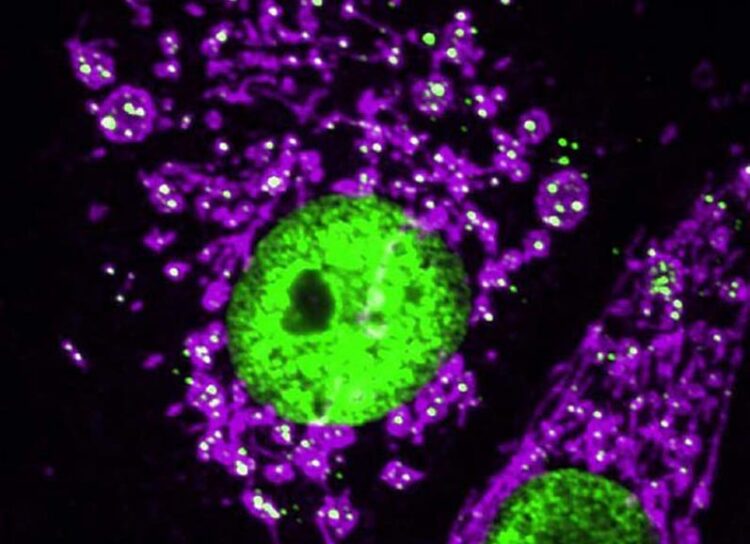How a metabolite causes inflammation and disease

Kidney cell accumulating fumarate. You can see the mitochondria in magenta and the genetic material of the cell in green. The large green dot in the middle is the cell nucleus and the small green dots outside the mitochondria mark the vesicles with mtDNA. Photo: Dr. Vincent Paupe, MRC Mitochondrial Biology Unit Cambridge
The accumulation of the metabolite fumarate in the mitochondrion, the powerhouse of a cell, can cause inflammation associated with diseases such as cancer and autoimmune diseases / Publication in Nature.
A new study shows for the first time a connection between a mitochondrial metabolite and the activation of an inflammatory response. Mitochondria are functional units of our cells that fulfil important tasks, i.e. chemical reactions, for the functioning of the cell. One of these tasks is the production of energy that is necessary for cell growth and reproduction. If certain chemical reactions in the mitochondrion change, diseases occur. For example, deficiencies in fumarate hydratase (FH) in the Krebs cycle, one of the most important metabolic pathways in mitochondria, cause an aggressive form of kidney cancer in humans. FH loss leads to the accumulation of the molecule fumarate, which contributes to the development of cancer. For this reason, fumarate is called an oncogenic metabolite, or “oncometabolite” for short.
The research team led by Alexander von Humboldt Professor Dr Christian Frezza, formerly at the University of Cambridge (United Kingdom) and now at the CECAD Cluster of Excellence for Aging Research at the University of Cologne, has now developed a new mouse and cell model together with the research group led by Professor Prudent of the University of Cambridge to deepen the understanding of aggressive kidney cancer. In the models, the silencing of the fumarate hydratase gene can be temporally controlled by the scientists. Using a combination of high-resolution imaging techniques and precise biochemical experiments, the scientists have shown that fumarate causes mitochondrial damage. This in turn releases the genetic material of the mitochondria in small vesicles called mitochondrial-derived vesicles. These vesicles filled with mitochondrial DNA (mtDNA) and RNA (mtRNA) trigger an immune reaction that eventually leads to inflammation. The study titled “Fumarate induces vesicular release of mtDNA to drive innate immunity” was published in Nature.
“Our study shows for the first time a correlation between a mitochondrial metabolite and the onset of inflammation, which could be the trigger for cancer and autoimmune diseases,” said Professor Frezza. “Based on these findings, we can now work on new approaches to treat patients, which will hopefully lead to the development of new therapeutic strategies to treat cancer patients in the future.”
In addition, a group at Trinity Biomedical Sciences Institute in Dublin led by Professor Luke O’Neill in collaboration with Christian Frezza’s research group has described a similar mechanism in macrophages. Macrophages are cells of the body that are responsible for eliminating harmful microbes. Here, the researchers found that mitochondrial RNA released by the macrophages’ mitochondria, rather than DNA, is the main trigger of inflammation. The study “Macrophage fumarate hydratase restrains mtRNA-mediated interferon production” was also published in the journal Nature.
The research was carried out at the University of Cambridge and the CECAD Cluster of Excellence for Aging Research of the University of Cologne. It was funded by Cancer Research UK, the European Research Council, the German Research Foundation (DFG), the Alexander von Humboldt Foundation and the Medical Research Council. The collaborative research was conducted in the laboratory of Luke O’Neill at Trinity Biomedical Sciences Institute in Dublin, Ireland.
Wissenschaftliche Ansprechpartner:
Professor Dr Christian Frezza
Cluster of Excellence on Cellular Stress Responses in Aging-Associated Diseases (CECAD) at the University of Cologne
+49 221 478 84308
christian.frezza@uni-koeln.de
Originalpublikation:
Fumarate induces vesicular release of mtDNA to drive innate immunity
https://www.nature.com/articles/s41586-023-05770-w
Macrophage fumarate hydratase restrains mtRNA-mediated interferon production
https://www.nature.com/articles/s41586-023-05720-6
Media Contact
All latest news from the category: Life Sciences and Chemistry
Articles and reports from the Life Sciences and chemistry area deal with applied and basic research into modern biology, chemistry and human medicine.
Valuable information can be found on a range of life sciences fields including bacteriology, biochemistry, bionics, bioinformatics, biophysics, biotechnology, genetics, geobotany, human biology, marine biology, microbiology, molecular biology, cellular biology, zoology, bioinorganic chemistry, microchemistry and environmental chemistry.
Newest articles

NASA: Mystery of life’s handedness deepens
The mystery of why life uses molecules with specific orientations has deepened with a NASA-funded discovery that RNA — a key molecule thought to have potentially held the instructions for…

What are the effects of historic lithium mining on water quality?
Study reveals low levels of common contaminants but high levels of other elements in waters associated with an abandoned lithium mine. Lithium ore and mining waste from a historic lithium…

Quantum-inspired design boosts efficiency of heat-to-electricity conversion
Rice engineers take unconventional route to improving thermophotovoltaic systems. Researchers at Rice University have found a new way to improve a key element of thermophotovoltaic (TPV) systems, which convert heat…



